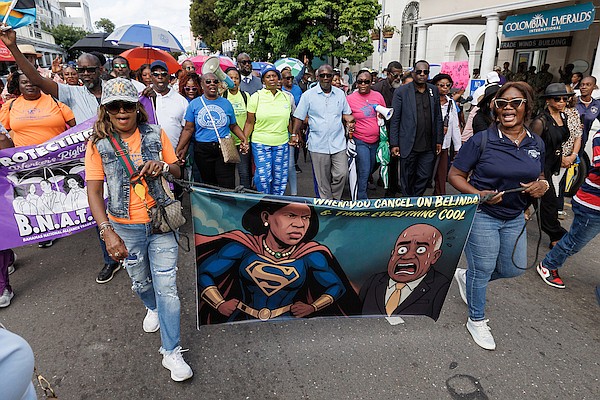A significant wave of industrial action swept through The Bahamas yesterday as over a thousand public school teachers failed to report to work, leading to the early closure of six schools. The mass absenteeism, orchestrated by Bahamas Union of Teachers (BUT) President Belinda Wilson, was part of a broader protest against the government’s handling of pay adjustments. According to Education Director Dominique McCartney-Russell, 1,135 out of 3,186 public school teachers were absent, with the majority concentrated in New Providence. The government has privately warned that participants in the protest could face salary deductions and disciplinary measures. Meanwhile, Labour and Public Service Minister Pia Glover-Rolle reported no widespread absenteeism among other public servants, despite calls for action from Bahamas Public Service Union (BPSU) President Kimsely Ferguson. The protest culminated in a march to Parliament, where demonstrators, including teachers, janitors, and social workers, voiced their frustrations over stagnant wages, poor working conditions, and lack of promotions. Among the protesters, janitress Geraldine Strachan shared her struggles with mounting bills and medical needs, while teacher aide Sharon McKenzie highlighted the emotional toll on educators. In Grand Bahama, social worker Taronya lamented her 12-year career without a promotion, citing systemic barriers to upward mobility. Prime Minister Philip “Brave” Davis faced criticism for his handling of the dispute, particularly after canceling a scheduled meeting with union leaders. In a national address, Davis accused some union leaders of “grandstanding and public drama,” while defending the government’s phased pay adjustment plan, which excludes certain categories of workers. The plan, aimed at closing the pay gap between public service and the wider sector, includes base pay increases of 8 to 31 percent over four years. However, union leaders argue that the plan prioritizes middle management over frontline workers, leaving many in precarious financial situations. The protest underscores deepening tensions between the government and public servants, with union leaders vowing to continue their fight for fair treatment and equitable pay.
